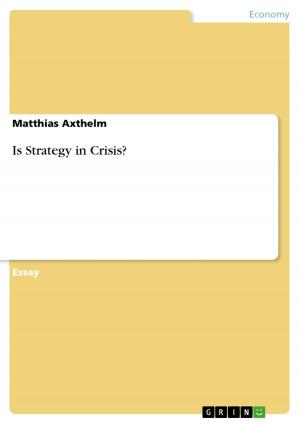How and why has Wal-Mart established its current international presence? An explanation
Business & Finance, Management & Leadership, Management| Author: | Marc Munzer | ISBN: | 9783640404728 |
| Publisher: | GRIN Publishing | Publication: | August 19, 2009 |
| Imprint: | GRIN Publishing | Language: | English |
| Author: | Marc Munzer |
| ISBN: | 9783640404728 |
| Publisher: | GRIN Publishing |
| Publication: | August 19, 2009 |
| Imprint: | GRIN Publishing |
| Language: | English |
Essay from the year 2008 in the subject Business economics - Business Management, Corporate Governance, grade: 1,7, University of Hull, language: English, abstract: Wal-Mart is the leading company in retail markets worldwide, with a net sale of $ 344,992 million in 2007 (Wal-Mart, 2007). Recently, its one-day sales topped the GDPs of thirty-six sovereign countries. 'If it were a Independent Republic of Wal-Mart, it would be China's sixth largest export market, and its economy would rank thirtieth in the world, right behind Saudi Arabia's' (Moreton, 2006, 59) Many would argue that Wal-Mart is 'the face of retail globalization' (Helen, 2008, 10). Nevertheless, this multinational company had to struggle through testing times to reach this status. The growth of any corporation is neither assured, nor a straightforward process - Wal-Mart's development was not only connected with executive ambition, motivation, progression and new opportunities; but also inevitably uncertain times, unnecessary costs, legitimacy and resistance. This consequently lead to Wal-Mart's failing in certain markets, and for this reason the board of directors need to comprehend why these different events occurred, as well as considering possible approaches to overcrossing certain barriers. This work takes a closer look at how Wal-Mart became so influential, which will be done through considering their history until present, and their strategy. Specifically discussed will be whether Wal-Mart adapted their global strategy in different countries, and if so, how such adaption was implemented.
Essay from the year 2008 in the subject Business economics - Business Management, Corporate Governance, grade: 1,7, University of Hull, language: English, abstract: Wal-Mart is the leading company in retail markets worldwide, with a net sale of $ 344,992 million in 2007 (Wal-Mart, 2007). Recently, its one-day sales topped the GDPs of thirty-six sovereign countries. 'If it were a Independent Republic of Wal-Mart, it would be China's sixth largest export market, and its economy would rank thirtieth in the world, right behind Saudi Arabia's' (Moreton, 2006, 59) Many would argue that Wal-Mart is 'the face of retail globalization' (Helen, 2008, 10). Nevertheless, this multinational company had to struggle through testing times to reach this status. The growth of any corporation is neither assured, nor a straightforward process - Wal-Mart's development was not only connected with executive ambition, motivation, progression and new opportunities; but also inevitably uncertain times, unnecessary costs, legitimacy and resistance. This consequently lead to Wal-Mart's failing in certain markets, and for this reason the board of directors need to comprehend why these different events occurred, as well as considering possible approaches to overcrossing certain barriers. This work takes a closer look at how Wal-Mart became so influential, which will be done through considering their history until present, and their strategy. Specifically discussed will be whether Wal-Mart adapted their global strategy in different countries, and if so, how such adaption was implemented.















